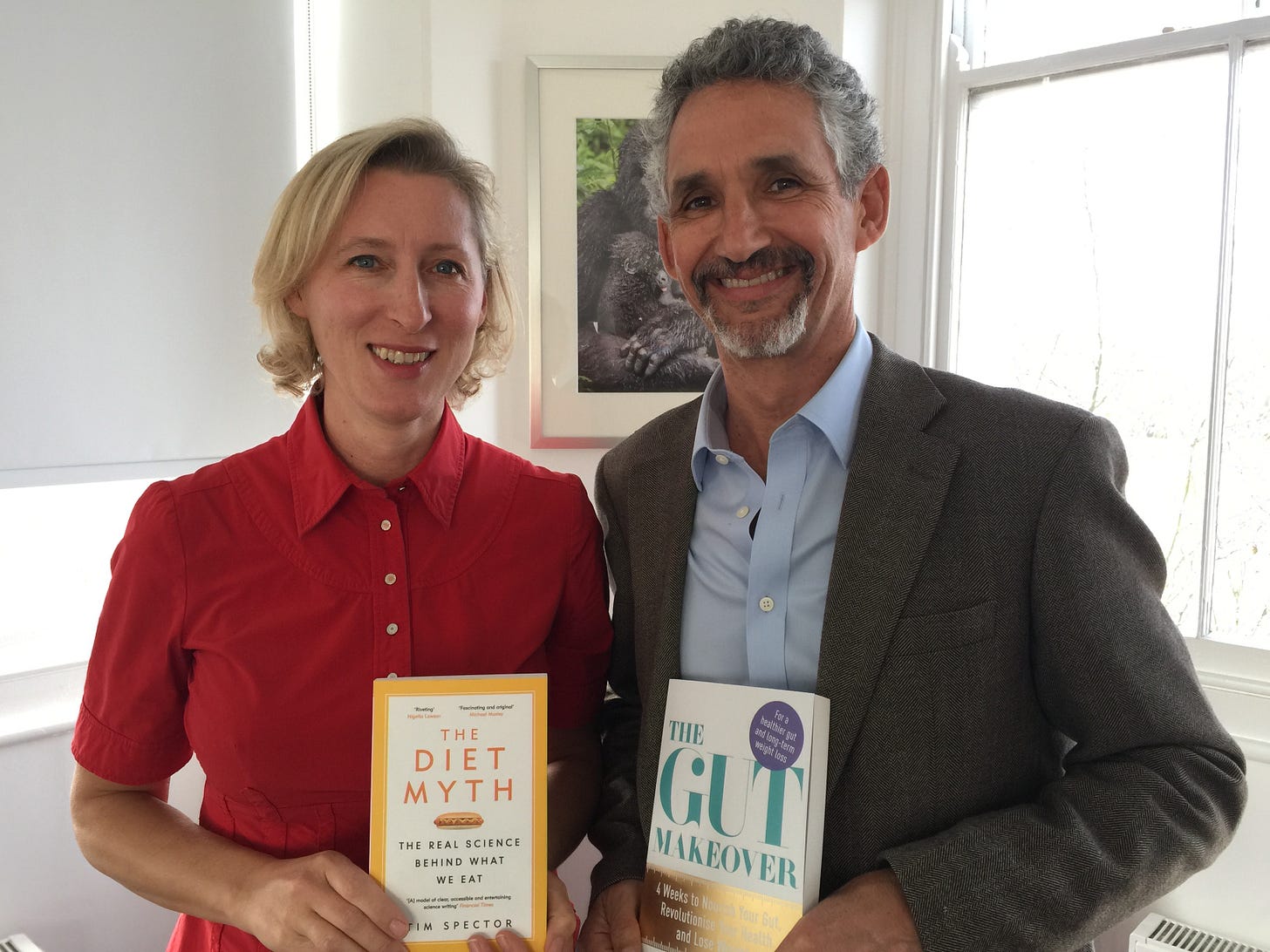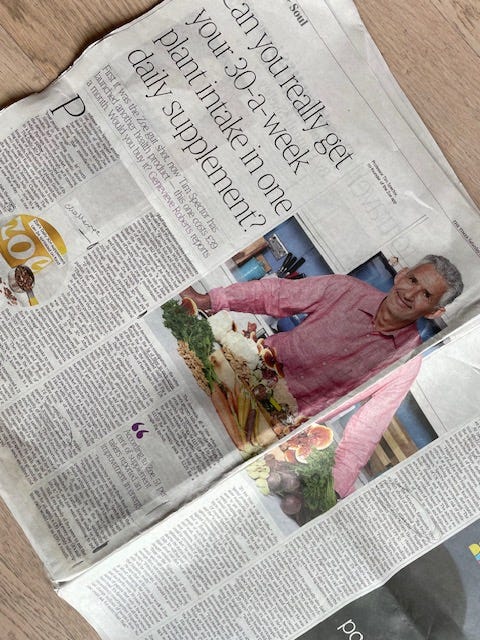Has national treasure Tim Spector sold out?
With Zoe's latest ✨sprinkly supplements (after those gut shots, and ongoing app subscriptions)
I was overjoyed to meet and interview Tim Spector late 2016 around when he was launching his original microbiome poo testing company Map my Gut.
At last a doctor unafraid to talk common sense and encourage us all back to basics!
Eg: eat real unprocessed food and we can shift our microbiomes (the bacteria in our guts) into a healthy pattern which can give us overall robust health.
Finally the real food message (as opposed to processed low-fat foods and calorie counting which were still the mainstream medical messages at the time).
And not selling diet gadgets or expensive supplements.
I had already worked out by reading emerging microbiome science papers and practicing it with clients, that to have a healthy gut, you didn’t need to be affluent which is why I loved and still do love this food approach.
You can go around Iceland, Asda, or Aldi, loading up your trolley with frozen berries and peas, sprinkling herbs and spices (even dried ones all over your food) and nuts and seeds getting your plant diversity in to increase the beneficial microbes for health in your gut.
Tim’s Map my Gut reports included a diversity scale so you could see how diverse your gut microbes were, and if low, feel motivated to get cooking or choosing those spiced-up curries and getting those mixed berries in your breakfast to improve it. Then a few weeks later, measure again if you wanted to.

The reason meeting Tim gave me so much hope for the future was that I thought he was using his growing media “platform” not just to promote his books and microbiome testing company but for the health of the nation.
He called out the supplement industry and encouraged eating a food rainbow.
The fact he was/is a medical doctor and scientist with hundreds of papers behind him, meant the nutrition world - from dieticians and public health officials and supplement companies - could not easily discredit him.
In 2016 this is what he told me:
“I think we have to totally go home throw away those rubbish supplements in our bathrooms and kitchens go back to basics…real food has all the nutrients and supplements we need.”
A few months later I heard that investors were pulling the plug on Map my Gut. It was short lived.
It was a shame because it was a brilliant tool that could have been rolled out in the NHS with everyone having access and patients being sent home with a shopping list food prescription and some common sense eating tactics (eg eat more apples, have some frozen berries) etc.
Around this time there was a lot of chatter in the science community on how to monetise the microbiome. Getting you to eat more mixed seeds, or build a better herb and spice rack at home wasn’t I guess, a goer, for those looking for commercial opportunities.
Fast forward to Zoe, the subsequent company Tim co-founded. An AI-point-based app which influences your eating based on poo and blood tests and wearing a continuous glucose monitor for a spell.
I tried the Zoe app on a 4-month package on myself and found it created stress and anxiety in me around food. In my case in retrospect one-month would have been enough.
Then Zoe launched with M&S an expensive, plastic-polluting gut shot.
And yesterday, Zoe launched, you guessed it, a supplement, fronted by Tim.
It’s called Daily 30+ - a high-fibre supplement you sprinkle on your yoghurt, hummus or salad to get your fibre and plant polyphenol colour count up each day.
Ingredients are “minimally processed” and include freeze-dried beetroot and chicory root, spices such as turmeric and cumin, and nuts and seeds, red lentils - 30 different substances in total.
Everyone is entitled to change their minds but reading the Linkedin announcement yesterday I felt disappointment in the direction Zoe and its founders are taking the company.
And then I read the interview Tim did with The Times as part of the launch.
It’s behind a paywall (because journalists have to eat too) but here are the main points I was spluttering on my kefir and Aldi seed mix as I read it.
Contradictions
““it is intended to complement a plant-rich diet rather than supplement a bad one.”
Then later on in the article he says: “You might have an unhealthy sandwich… and just want something to put into it.”
So is he saying it’s a way to supplement a “bad” food choice (eg the sandwich) which earlier in the article he said the supplement wasn’t intended for?
On detractors…
“Big food companies have billion-pound budgets and pay influencers to attack Zoe.”
Really?
In my case, you the paid subscribers are funding this independent writing, untouched by sponsorship and influencing. Journalism like this is founded on putting you the reader’s interests at the forefront of any product I try out. So that’s a bit of a sweeping claim.
He says the Zoe podcast gives “free” advice to more than 3 million listeners
If you are a Zoe listener, remember there is no such thing as a free lunch.
In my view the podcast is a powerful marketing tool for the Zoe brand - eg the app (£24.99 a month, and £299 for the testing, the kefir shot (£2 each), and now this supplement (£39 a month per person).
For instance if it led you to buy the Zoe app for a year and bought the tests plus had a gut shot 20 x a month and the 30+ daily you’d be looking at £1,547 per year.
Why croutons and how independent is the study?
Zoe says there is a randomised controlled trial to underpin its supplement based on comparing use of it with another group eating croutons!
Surely a group eating real fruit and veg etc would have been more useful a comparison for customers and nutritional therapists like me to judge the true value or not of the 30+ supplement?
And how independent is the study? (only a layperson summary seems to be available at the moment). A published peer-reviewed study does not seem to be available on the usual channels yet. If it is funded by Zoe it would be a conflict of interest.
UPDATE TO THIS ARTICLE: The day after publishing my article here, Zoe did put the RCT on its web site. What this revealed to me was that the study hasn’t been peer-reviewed yet. It also revealed that the study was funded by Zoe itself. Having said that they do clearly state under the section “competing interests” any author links with the company. All this to say 1) it’s not good practice of a company to publicise and use the findings for marketing before publication of the final peer-reviewed paper. 2) I find it difficult to take seriously findings of an RCT where the company whose product is being tested, is also the funder and authors have financial interests in the success of the product.
For more on the difficulties around food and supplement studies see this piece by my friend neuroscientist Dr Miguel Toribio Mateas
So what’s my take on all this?
Why would you spend all that money putting the same 30 substances on your hummus or yoghurt every day? Surely important to move around mixes of different fibres for your microbiome, not have the same 30? The gut thrives on diversity - which means changing things up.
Why am I feeling upset?
I thought Zoe co-founder Tim was a food first ambassador.
But I’m seeing too many contradictions - eg the Zoe web site states “we believe there is nothing more important than the food we eat” but now they are pushing an expensive sciencey-sounding sprinkle.
I guess that hooking users into an ecosystem of high-end supplements, shots, and ongoing app subscriptions is where the scalability and profitability lies.
I think I’m upset because I’m passionate about empowering people to eat real food and not be dependent on supplements to nudge the microbiome into the right place.
How to get back to real food
You could do good work on your gut by adding a tablespoon of inexpensive ground flax seeds to your yoghurt or kefir such as these daily (or hemp, or chia, or pumpkinseeds etc - changing it up when you feel like it).
Use your dried spice and herb cupboard frequently on meals moving around lots of different ones. Then move around your freezer selection of berries and veg too - you have to eat anyway.
Why not vary it all along your week - because the science says the sweet spot is 30 different plants a week (not a day)? You also get good fats, protein, and vitamins when eating real food as well as the highly-prized fibre and polyphenols in there. ✨







I personally make a “diversity muesli” with wheat, rye, spelt, barley, buckwheat flakes (whole cereal squashed), oats, dried apricots, prunes, goji berries, dried mango, cinnamon, turmeric, cocoa, dried coconut, a 4-mix seed from Aldi, extra pumpkin seeds, flaked almonds, crushed walnuts, flaxseed and probably something else that I’m forgetting. I buy some of the ingredients from Aldi, and some in bulk from Amazon (like the cereal flakes). It’s loaded with fibre and polyphenols and it costs a whole load less than the Zoe sprinkly supplement. Plus I can chop and change it as I please. I’d rather do this than get locked into a subscription. Thank you again for your work. You’re brilliant! 🤩
The worst thing about Zoe is that, for many of us, it first came into view as a very worthy research platform into Covid. Having piqued our interest and admiration, it seems that Spector lost no time in monetising the goodwill to the maximum extent. I looked into the dieting plan, but instinctively looked away when I saw the price. I've never looked back. For me, he's moved himself into the same category as Michelle Mone: a Covid profiteer.